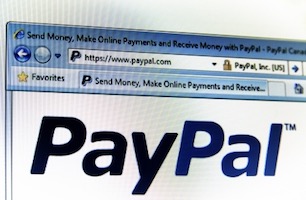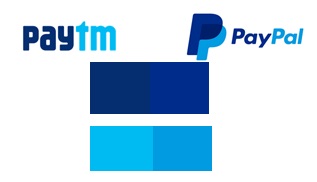 On November 18, 2016, Paypal Inc. filed an objection at the Indian Trademark Office accusing Paytm, an Indian mobile wallet company, of trademark infringement. The objection comes at the heels of the recent windfall made by the latter on account of a cash-strapped nation moving rapidly towards a cashless normal.
On November 18, 2016, Paypal Inc. filed an objection at the Indian Trademark Office accusing Paytm, an Indian mobile wallet company, of trademark infringement. The objection comes at the heels of the recent windfall made by the latter on account of a cash-strapped nation moving rapidly towards a cashless normal.
For six years, Paytm had been steadily becoming a household name in middle-class India – until it really hit the jackpot on November 8, 2016 when the Indian Prime Minister Narendra Modi announced demonetization of currency notes of Rs. 500 and Rs. 1000 – invalidating overnight 80% of the country’s cash in circulation. The drastic move was taken to tackle the vast amounts of unaccounted “black” money in the Indian economy that was being used for bribery, corruption, tax evasion and for funding separatists and terrorists – and has since invoked strong emotions, both in favor and against, from the media, politicos and citizens across the country.
A direct consequence to the demonetization has been an unprecedented increase in electronic transactions – with Paytm being at the forefront. Adding over half a million users a day, Paytm saw its daily transactions grow from 2.5 million to over 7 million a day and a 10-fold increase in the amount of money added to Paytm accounts in the first 14 days after the demonetization was announced.
Rapid growth in that short a time earns Paytm not only great profits and valuation, but also the attention of global competitors like PayPal. In its complaint, PayPal accused Paytm of having “slavishly adopted the two-tone blue color scheme” of PayPal’s own logo in entirety, and especially where “The first syllable in each mark is in dark blue color and the second syllable in a light blue color”. Further, PayPal also noted that “both marks begin with the term ‘PAY’ which consumers tend to remember more than the second syllable, with the marks being of similar length.”
The Indian Trademark law requires an applicant to publish and advertise their logo for a period of 4 months in which objections can be raised by third parties. Paytm applied for a trademark registration on July 18, 2016 – which means its four month window expired on November 18, 2016. PayPal’s last-day complaint has thus raised many an eyebrow on why a company like PayPal – with ample legal resources at hand – would wait right until the end of the window to file the complaint. Needless to say, it was only after the demonetization that PayPal felt threatened (read jealous) by the rise of Paytm in a market that until now has been ignored, underserved and/or underperformed by PayPal. It must be noted that PayPal had not registered its own trademark in India until after the demonetization – a fact that Paytm’s lawyer will undoubtedly cite at trial.
Notwithstanding the timing and PayPal’s motivations, the complaint and the subject matter do raise a few important points.
Is Paytm and PayPal branding similar?
The names PayPal and Paytm are similar to the extent both start with the world “Pay” – however given that both companies operate in the electronic transactions space, PayPal would have a tough time winning the argument based on just the word “Pay” in the name. In fact, there is precedent strongly in favor of Paytm here. In Micronix India vs Mr. J.R. Kapoor, for example, the Supreme Court observed that micro-chip technology being the basis of many of the electronic products, the word “micro” has much relevance in describing the products and therefore no one can claim monopoly over the use of the said word. Applying the same logic in this case, the word “Pay” has little distinctive relevance in the market to which PayPal and Paytm cater.
PayPal’s stronger argument lies in the use of a similar color combination. Even a brief look at the two logos betrays that similarity between the two. The color tones while not identical – are undoubtedly similar – the first syllable is a darker shade of blue while the second syllable is light blue.

Technically, the Paytm logo uses color codes #042e6f (dark blue) and #00baf2 (light blue) while PayPal uses #002d8b (dark blue) and #009be1 (light blue) – so one could argue that the colors are not exactly identical. The difference is more easily seen if you compare just the colors side by side. It will remain to be seen if the difference is big enough for consumers and more importantly for the court.
Can colors or color combinations be trademarked in India?

The Indian Trademark Law does protect colors to the extent the colors or combination of colors confer a distinctive characteristic to a product or service. Schedule 10 of the Trade Marks Act, 1999, pertains specifically to use of colors:
- A trade mark may be limited wholly or in part to any combination of colors and any such limitation shall be taken into consideration by the tribunal having to decide on the distinctive character of the trade mark.
- So far as a trade mark is registered without limitation of color, it shall be deemed to be registered for all colors.
PayPal will undoubtedly argue that the differences in the two sets of colors is minimal and inconsequential to the consumer’s eye – an ordinary consumer will not be able to discern the difference and naturally confuse between the two logos. This approach gives more weight to the overall look and feel of the brand – and at least partly abandons the question on whether PayPal has a trademark right over use of the particular colors.
It also opens up the discussion to whether the whole package – name, font and colors – used by Paytm and PayPal are similar enough for ordinary consumers in India to be deceived into buying the wrong product.
Does Paytm deceive consumers away from PayPal?
Consumer perception can be a tricky territory for PayPal, especially after Paytm’s customer base increased manifold over the last five weeks. The key question the court should ask is:
Would an ordinary consumer intending to use PayPal be confused into using Paytm instead?
The fact of the matter is that ordinary consumers like regular workers, grocers and Uber drivers use and hear the word Paytm all day every day – most of which would not even know about PayPal. PayPal’s foray into India has been limited largely to eBay shoppers, freelancers and IT software developers that are exposed to global economy much more than the ordinary consumer – which means that if PayPal and/or Paytm were to conduct a survey, it would likely result strongly in favor of Paytm.
However, had PayPal chosen to file a trademark infringement lawsuit before the demonetization move was announced (or perhaps anytime in 2011-2014) when Paytm had not yet established its household name status, it would have been a much easier battle (albeit also bearing much less rewards). PayPal would however be much better placed to win this dispute in virtually any other country (if and when Paytm expands its operations in those countries) – where PayPal still is recognized as a global payments leader.
_______________
The views expressed in this article are personal opinions and do not constitute legal advice – the author and his firm, Copperpod IP, have no interest or association with Paytm or with Paypal.

![[IPWatchdog Logo]](https://ipwatchdog.com/wp-content/themes/IPWatchdog%20-%202023/assets/images/temp/logo-small@2x.png)

![[Advertisement]](https://ipwatchdog.com/wp-content/uploads/2024/04/Patent-Litigation-Masters-2024-sidebar-early-bird-ends-Apr-21-last-chance-700x500-1.jpg)

![[Advertisement]](https://ipwatchdog.com/wp-content/uploads/2021/12/WEBINAR-336-x-280-px.png)
![[Advertisement]](https://ipwatchdog.com/wp-content/uploads/2021/12/2021-Patent-Practice-on-Demand-recorded-Feb-2021-336-x-280.jpg)
![[Advertisement]](https://ipwatchdog.com/wp-content/uploads/2021/12/Ad-4-The-Invent-Patent-System™.png)







Join the Discussion
No comments yet.